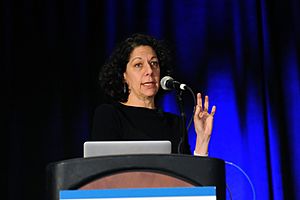Bonnie Bassler facts for kids
Quick facts for kids
Bonnie Bassler
|
|
|---|---|

Bassler at a 2015 American Society for Biochemistry and Molecular Biology meeting.
|
|
| Born |
Bonnie Lynn Bassler
1962 (age 63–64) Chicago, Illinois, U.S.
|
| Alma mater | |
| Known for | Quorum sensing |
| Spouse(s) | Todd Reichart |
| Awards | Wiley Prize in Biomedical Science (2009) Richard Lounsbery Award (2011) Shaw Prize (2015) Pearl Meister Greengard Prize (2016) Wolf Prize in Chemistry (2022) Genetics Society of America Medal (2020) Princess of Asturias Award (2023) |
| Scientific career | |
| Institutions | Princeton University |
Bonnie Lynn Bassler, born in 1962, is a brilliant American molecular biologist. She is a professor at Princeton University and a researcher at the Howard Hughes Medical Institute. Dr. Bassler studies how tiny bacteria "talk" to each other using chemicals.
She made amazing discoveries about this bacterial communication, which is called quorum sensing. Her work helps us understand how bacteria work together. It also suggests new ways to fight harmful bacteria by stopping their communication.
Dr. Bassler has won many important awards for her research. These include the Princess of Asturias Award (2023) and the Wolf Prize in Chemistry (2022). She is also a member of the National Academy of Sciences and the Royal Society.
Contents
Early Life and Education
Bonnie Bassler was born in Chicago, Illinois, and grew up in Danville, California. Her interest in science started very early. When she was just 13, she worked as an assistant at the Miami Zoo. Later, she helped out at a local animal clinic.
She first went to the University of California, Davis to study to become a veterinarian. However, she soon became fascinated by genetics and biochemistry. She earned a Bachelor of Science degree in biochemistry.
At UC Davis, Dr. Bassler worked on a project studying bacteria. She found that tiny prokaryotes, like bacteria, are "perfect creatures to work on." She then went to Johns Hopkins University, where she earned her PhD in biochemistry in 1990.
Discovering Bacterial Communication
After her PhD, Dr. Bassler did more research at the Agouron Institute in California. She worked with Michael R. Silverman, who first found out about quorum sensing. He studied a special ocean bacterium called Vibrio fischeri.
These bacteria glow in the dark, but only when there are enough of them together. They use chemical signals to count their numbers. If the group is big enough, they all glow at once, making a bright light.
Dr. Bassler's research showed that bacteria are "multilingual." This means they use many different chemical signals to talk to each other. She also found that bacteria use quorum sensing to tell the difference between their own kind and other types of bacteria. This ability was once thought to be only in more complex living things.
Her work also revealed that even viruses and human cells use quorum sensing. She discovered that harmful bacteria use this communication to become more dangerous. Dr. Bassler has developed ways to stop this communication. These methods have shown promise in stopping infections in animal studies.
In 1994, Dr. Bassler joined the faculty at Princeton University. She is now the head of the molecular biology department. Her lab at Princeton continues to study quorum sensing.
Her discoveries have changed how scientists think about the world of microbes. Her research not only helps us understand basic science but also offers new ways to treat bacterial diseases. In 2002, she received a MacArthur Fellowship for her important contributions.
Research on Bacterial Signals
During her research after her PhD, Dr. Bassler studied how to change the genes that make Vibrio harveyi bacteria glow. She found that these bacteria use several different molecules for quorum sensing.
She discovered that bacteria use these chemical messages to turn many genes on or off. This allows bacteria of the same species, and even different species, to work together. They cooperate much like cells in a multi-celled organism do.
Dr. Bassler also found that a chemical element called boron helps in this communication. Boron is very common in the oceans, where V. harveyi bacteria live.
How Bacteria Talk and Cooperate
Dr. Bassler's lab focuses on how bacteria communicate within their own group and with other groups. They study how bacteria recognize their own kind versus others. They also look at how bacteria share information and work together as a population.
Some of the specific topics her lab researches include:
- How bacteria tell "self" from "other" using special signals.
- How tiny RNA molecules control quorum sensing.
- How bacteria form communities called biofilms and share resources.
- Ways to control quorum sensing when needed.
- How quorum sensing works in the microbiome (all the microbes living in and on us).
Awards and Honors
Dr. Bonnie Bassler has received many prestigious awards for her groundbreaking work:
- 2002 MacArthur Fellowship
- 2006 Elected member of the National Academy of Sciences
- 2007 Fellow of the American Academy of Arts and Sciences
- 2009 Wiley Prize in Biomedical Sciences
- 2011 Richard Lounsbery Award
- 2011 L'Oréal-UNESCO For Women in Science Awards Laureate for North America
- 2015 Shaw Prize in Life Science and Medicine
- 2016 Pearl Meister Greengard Prize
- 2016 Max Planck Research Award
- 2018 Dickson Prize
- 2018 Ernst Schering Prize
- 2020 Genetics Society of America Medal
- 2020 Gruber Prize in Genetics
- 2021 Paul Ehrlich and Ludwig Darmstaedter Prize
- 2022 Wolf Prize in Chemistry
- 2023 Canada Gairdner International Award
- 2023 Princess of Asturias Awards
- 2023 Albany Medical Center Prize
- 2025 National Medal of Science
 | James B. Knighten |
 | Azellia White |
 | Willa Brown |

